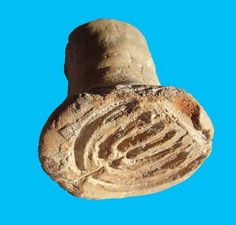Bread Stamp Inscribed “The Way of the Lord,” 6th century CE
Eastern Mediterranean
Byzantine period
Sixth century CE
Length- 11 cm, width- 2.8 cm, height- 3.4 cm
The Greek inscription reads- “The Way of the Lord” – a phrase soaked with Christian symbolism, intimates the Way of life, the Christian Way, the Way of God himself. This use of the word ‘Way’ closely corresponds to its modern English metaphoric meaning- manner or method of action. While this phrase is used by many Church Fathers, the most significant use of the phrase is in a quotation from Isaiah 40-3- “The voice of him that crieth in the wilderness, Prepare ye the way of the Lord, make straight in the desert a highway for our God.” Each evangelist reports that John the Baptist used this verse while calling people out to the desert to be baptized and redeemed- “In those days came John the Baptist, preaching in the wilderness of Judaea, and saying, repent ye- for the kingdom of heaven is at hand. For this is he that was spoken of by the prophet Isaiah, saying- the voice of…” (Matthew 3-3; cf. Mark 1-3, Luke 3-4, John 1-23).
from Isaiah 40-3- “The voice of him that crieth in the wilderness, Prepare ye the way of the Lord, make straight in the desert a highway for our God.” Each evangelist reports that John the Baptist used this verse while calling people out to the desert to be baptized and redeemed- “In those days came John the Baptist, preaching in the wilderness of Judaea, and saying, repent ye- for the kingdom of heaven is at hand. For this is he that was spoken of by the prophet Isaiah, saying- the voice of…” (Matthew 3-3; cf. Mark 1-3, Luke 3-4, John 1-23).
Modern scholarship views the use of the verse from Isaiah as a connection between John the Baptist and the Essenes- the “voice in the wilderness” was one of the reasons used by Essenes to explain their retirement to the desert. Urging repentance and baptism, together with the reference of Isaiah to preparing the path of the Lord, demonstrate the connection between the preaching of John the Baptist and the teachings of the Qumran sect. This stamp with two simple words, and the shape of a shoe , manages to call to the minds of the believers the deeds of John the Baptist and the idea of redemption. It is more than probable that this stamp was used in the Eucharist itself.
, manages to call to the minds of the believers the deeds of John the Baptist and the idea of redemption. It is more than probable that this stamp was used in the Eucharist itself.
AE Unpublished
Reference- Dupont-Sommer 1954- Lampe 1961- 936 s. v. Flusser 2002- 232-233.
1961- 936 s. v. Flusser 2002- 232-233.
Joan Goodnick Westenholz. Three Faces of Monotheism. Bible Lands Museum Jerusalem, 2007. p. 127




